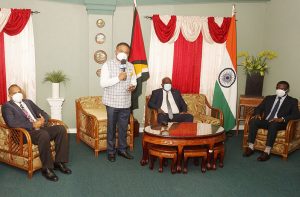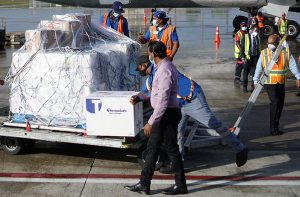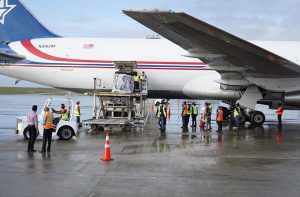-PM Phillips urges Guyanese to get vaccinated and prevent deaths
AMID Guyana’s efforts to intensify its COVID-19 vaccination programme and immunise a significant portion of the population by year end, the country received 80,000 doses of the Oxford-AstraZeneca vaccine from India on Sunday at the Cheddi Jagan International Airport (CJIA), Timehri, East Bank Demerara.

The aircraft that transported the vaccine arrived at 07:19 hrs. The doses of vaccine were presented to the Prime Minister, Brigadier (ret’d) Mark Phillips by the High Commissioner of India to Guyana, Dr. K.J.Srinivasa, in the presence of Minister of Foreign Affairs and International Cooperation, Hugh Todd and Minister of Health, Dr. Frank Anthony.
At a short press conference afterwards at the airport, the High Commissioner highlighted, “These 80,000 doses signify the depth of our friendly relations with Guyana and it also shows our commitment to the world as a first responder.”

The vaccine donations from the South Asian country were made in keeping with the country’s ‘vaccine maitri’ or ‘vaccine friendship’ initiative, whereby the country has been donating thousands of doses of the COVID-19 vaccine to countries around the world. Dr. Srinivasa related that India’s Prime Minister, Narendra Modi, has committed to leveraging India’s production and delivery capacity to help the entire world combat the novel coronavirus and the effects of the COVID-19 pandemic.
India’s donation to Guyana is part of the wider donation of 570,000 doses of this vaccine earmarked for the Caribbean region. Barbados, Dominica, Antigua and Barbuda, St. Kitts and Nevis, St. Lucia, St. Vincent and the

Grenadines and Suriname all received vaccines from India already. Importantly, the Indian High Commissioner emphasised that India did not donate the vaccines with the expectations of any favours in return.
“I want to stress here that India donates these vaccines with nothing in demand (from) the country. We do not ask for any quid pro quos. India is donating the vaccines in a spirit of collaboration, in a spirit of friendship, and in a spirit of helping our friends to acquire these vaccines across the world,” the diplomat assured.
This Oxford-AstraZeneca vaccine is manufactured by the Serum Institute of India and it is called ‘Covishield’ in that country. The vaccine is given in two doses and has the efficacy of about 82.4 per cent, once the second dose is given after about eight to twelve weeks. Since the vaccine is given in two doses, the 80,000 doses donated means that 40,000 persons can be vaccinated from this tranche of vaccines. And, as per the local vaccination schedule, frontline, healthcare workers will be offered the vaccines first. Subsequently, the elderly, other frontline workers and teachers will be offered the vaccines.
“By delivering this Covishield vaccine, India has demonstrated its willingness and ability to work with its friends across the world, especially developing countries through global south to south cooperation,” the High Commissioner said. Meanwhile, Prime Minister Phillips expressed gratitude to the Government and People of India on behalf of the Government and People of Guyana.
STRONG APPEAL
With this donation, Guyana would have received 103,000 doses of COVID-19 vaccines so far. China donated 20,000 of its Sinopharm vaccine, while Barbados sent 3,000 Oxford-AstraZeneca vaccine doses from the portion it received from India. With enough vaccines to immunise a substantial portion of the population, the Prime Minister called on persons to come forward and take the vaccine, since vaccines are an effective tool of helping to prevent the dreaded disease.
“The vaccination will help us in a substantial way as we continue in the recently started phase two of dealing with COVID-19,” the Prime Minister said, highlighting that the vaccine is effective in preventing COVID-19 deaths. Research has found that the Oxford-AstraZeneca vaccine offers 100 per cent protection against the severe form of COVID-19, hospitalisation and death in a primary analysis of Phase III clinical trials.
Recently, President of Guyana, Dr. Irfaan Ali, announced that the government will strive to ensure that Guyana achieves herd immunity by the end of this year. Herd immunity will occur once about 80 per cent of the population is immune to the disease, and vaccination is a way of ensuring immunisation.
As such, the Health Minister, Dr Anthony, highlighted that Guyana is exploring all opportunities to procure more vaccines. As part of those efforts, he noted that the government continues to engage the Government of India for additional vaccines. One of India’s indigenous vaccines, Covaxin, has been on Guyana’s radar. Following the completion of Phase III clinical trials, Dr. Anthony noted that the vaccine showed efficacy of 81 per cent. Trials have also been conducted with children, which could dictate whether the vaccines could eventually be used on children.
“(Covaxin) is certainly one that we are looking at… and we are satisfied with the safety profile,” Dr. Anthony related.
Currently, it is not mandatory for anyone to take the COVID-19 vaccines in Guyana. However, the Health Minister has continuously emphasised that vaccines are effective tools to help countries exit the COVID-19 pandemic. The World Health Organisation (WHO) has also issued Emergency Use Authorisation (EUA) for this Oxford-AstraZeneca vaccine.




.png)


![Front-Page Prime Minister of Guyana, Brigadier (ret’d), Mark Phillips (second left) received the ‘Covishield’ Oxford-AstraZeneca vaccines donated by the Government of India from the High Commissioner of India to Guyana, Dr. K. J. Srinivasa (second right). Also in the photo is Minister of Health, Dr. Frank Anthony (left) and Minister of Foreign Affairs and International Cooperation, Hugh Todd (right) [Elvin Croker photo]](https://guyanachronicle.com/wp-content/uploads/elementor/thumbs/Front-Page-1-p3w9t7jhp3uoaeunvgi9on7b3zatkte02uunvca6lq.jpg)






